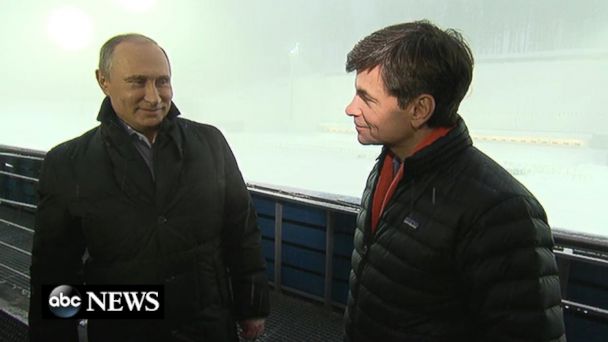Putin: 'Can't Feel Weak' in the Face of Terror Threats to Sochi Olympics
Russian President Vladimir Putin vowed his government "will do whatever it takes" to prevent a terror attack during next month's Winter Olympics in Sochi.
"If we allow ourselves to be weak, feel weak, let our fear to be seen, by doing that we'll assist those terrorists in achieving their goals," Putin said.
"Our job, needless to say, the job of the Olympics host, is to ensure security of the participants in the Olympics and visitors to this festival of sports and we will do whatever it takes," he said.
Putin added, "We would try and make sure that security measures were not be in your face, did not put pressure on the athletes and visitors or reporters. At the same time we'll do everything within our power to make sure those measures are efficient."
Excerpts from the interview will air on Friday's "World News with Diane Sawyer" and much more will air on a special edition of Sunday's "This Week with George Stephanopoulos."
During the wide-ranging interview, Putin's first with an American network since returning to the Kremlin in 2012, the Russian leader discussed the status of Edward Snowden, defended his position on gay rights, and sought to sooth fears that terrorists plan to strike the Olympics.
Putin, however, dismissed concerns from some Olympic officials and athletes that there will be no "party" at the Olympics due to heavy security.
The security plan for the Sochi Olympics is massive.
Russian authorities have set in motion an operation in and around Sochi ahead of the Olympics dubbed the "ring of steel." Some 40,000 troops are being deployed, along with anti-aircraft missiles and teams of Cossacks, the traditional fur-hatted defenders of the tsars, patrolling the streets. Vehicles are being inspected at checkpoints set up around the region. Russia has also reportedly set up a sophisticated electronic surveillance system.
In short, these Olympics are expected to take place on lockdown. They may have reason to be worried.
Last summer Doku Umarov, Russia's most wanted terrorist, urged his followers to strike the games. Despite stepped up anti-terrors sweeps by Russian troops, twin bombings killed dozens in the city of Volgograd in late December. Last week, authorities launched another anti-terror sweep after booby-trapped cars were discovered in nearby Stavropol, their drivers mysteriously murdered.
Putin personally oversaw much of the Sochi Olympics' planning. So much so that they were dubbed "Putin's Games" and are seen as his effort to showcase Russia's return as a world leader after the collapse of the Soviet Union. During today's interview, however, Putin denied that these Olympics were his personal pet project.
"It's not my personal ambitions. It's the direct interest, concentrated interest of the State and of our people. Naturally, when I see it and when we do it, of course, I take pleasure in it. But, once again, this isn't to satisfy some ambition," he said.
"There is also a moral dimension to it," Putin said speaking frankly about the mood of the Russian people. "I'll tell you about it openly. There is nothing to hide or be embarrassed by here. Following the collapse of the USSR, following hard and, let's put it bluntly, blood-soaked developments in the Caucasus, the overall state society was depressing and pessimistic. We need to cheer up, we need to understand and feel that we are capable of pulling off major, large-scale projects and do so on schedule and with good quality."
Putin also rejected allegations that massive corruption is to blame for what is said to be the most expensive Olympic games in history.
Asked about the international uproar over Russia's gay propaganda law, Putin clarified that the law does not ban being gay, just what it describes as homosexual "propaganda" around minors.

ABC News
Like "This Week" on Facebook here . You can also follow the show on Twitter here .